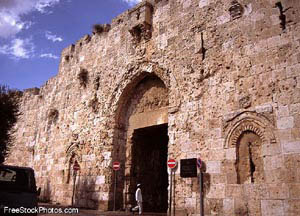The service that concludes Yom Kippur is known as ne’ilah, roughly meaning “the hour of
the closing of the gates”—a reference to the last opening afforded to us for
repentance and renewal as the Days of Awe draw to an end.
As this sacred season ends, so it commences. This week’s Torah portion, Shoftim, is always read at the beginning
of Elul, the month of self-reflection and preparation that precedes the fall
holy days. It opens: “Judges and
officers you shall appoint for yourselves in all your gates.” On a surface level, this injunction calls us
to establish a legal system, but most commentators delve deeper into the
imagery of gates. The Hasidic teacher Mei Shiloach (Rabbi Mordechai Yosef
Leiner of Izbica) reads the passage as a spiritual imperative, identifying the
gates with the seven physical openings through which we take in the world: two
eyes, two ears, two nostrils, and a mouth.
What does this metaphor teach us? If we understand the “gates” in the passage
to be the instruments of our sensory perception, what would it mean for us to
appoint “judges” over each of them? Mei HaShiloach implies that we must
carefully govern both the information we seek to acquire and the ways in which
we use that information. Our challenge
is to make every effort to view the world through positive attributes such as
justice, kindness, compassion, and honesty.
If this was true for Mei
HaShiloach almost two centuries ago, all the more does it apply to us, for
we live in an age of information overload.
Our senses are bombarded daily with images and ideas—many of which are
far from positive. What we choose to
take in goes a long way toward determining what we, in turn, put back out into
the world. Now, more than ever, we must
be vigilant guardians of our “gates.”
In his wonderful book on our fall holy days, This is Real and You are Completely
Unprepared, Rabbi Alan Lew reminds us: “Judges shall you put in all your
gates. This is how Teshuvah begins. When Elul comes around again, watch the
window. Keep a mindful eye on the gates
of the soul.” As Elul begins, this
Tuesday, and through the days that will bring us to Rosh Hashanah, try paying
closer attention to all that enters your “gates” and how it affects your
emotions and actions.


